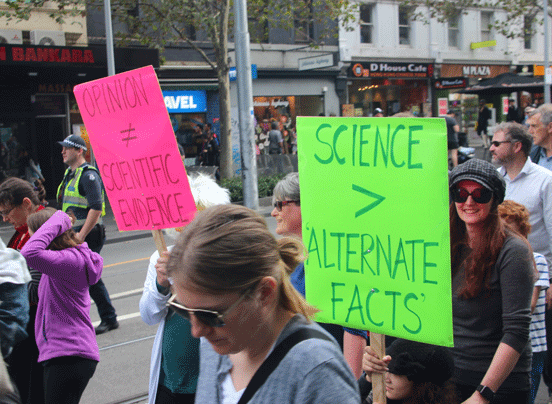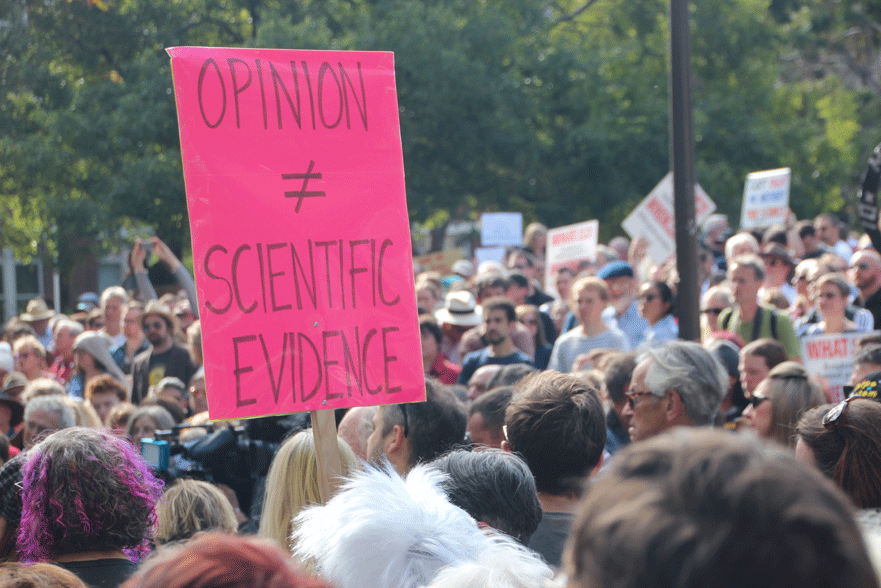
On April 23, 2017 [Earth Day], there was a March for Science in Washington DC and around the world. The march primarily focused on the science surrounding climate change and the Trump administration’s response (or lack thereof) to it. You saw protesters holding signs like “Science, not Silence,” or, “Science is the Answer,” or, “Science Does not Lie.”

Also in recent headlines, Bill Nye (From the 90’s kid’s television program Bill Nye the Science Guy) has been doing several debates, media interviews, and now has his own Netflix show called Bill Nye Saves the World, in which he delves into the science behind climate change, genetically modified food, vaccines, sexuality, overpopulation, panspermia (the idea that life on earth came from space), etc.
How should Christians view science? Does science threaten the Christian faith? Do faith and science inherently contradict?
 What is Science?
What is Science?
As someone who has a degree in Metallurgical Engineering, I love science. Websters defines science as, “knowledge or a system of knowledge covering general truths or the operation of general laws especially as obtained and tested through scientific method.” In other words, science is a systematic way of thinking about how to make sense of the world and the universe that we observe around us. You form a hypothesis about why something works the way it does, design an experiment to test your hypothesis, gather data and results, and then analyze those results. This is what humanity has done throughout history.
Science relies on the presupposition that the universe is both observable and orderly. In the western world, during the 15th-17th centuries, science exploded based on a Christian worldview which believed that God had created the world, that the world is orderly because God is a God of order and not disorder, and that it is a good thing to discover the functions behind God’s design with the reasoning abilities that he has given humanity. Scientists such as Francis Bacon and Johannes Kepler held to such views.
Is Science All There Is?
Today, in our culture, however, we see that science is used for more than just describing how the universe works. Science is now being used (or rather abused) to say things like, “Science proves that God doesn’t exist,” or that, “Science and faith can’t mix.” Many scientists such as Bill Nye and others promote a view called scientism, which essentially says that the only truth we can know is that which is proved by science. As a result, many in the Christian church have either distanced themselves from science or just write it off as being anti-faith. However, this ought not be.
 Scientism is philosophically inconsistent. The claim that, “The only truth we can know is that which is proved by science,” is not itself a scientific claim, but rather a philosophical claim. Science cannot prove or disprove that assertion. You can’t put those words in a test tube, run an experiment, and see if it’s true. Thus, scientism fails its own test for truth.
Scientism is philosophically inconsistent. The claim that, “The only truth we can know is that which is proved by science,” is not itself a scientific claim, but rather a philosophical claim. Science cannot prove or disprove that assertion. You can’t put those words in a test tube, run an experiment, and see if it’s true. Thus, scientism fails its own test for truth.
The Limitations and Value of Science
In order to view this subject properly, we must first recognize the natural limitations within science itself.
- Science cannot make metaphysical truth claims (such as “God exists/doesn’t exist,” or, “This is right/wrong”). Rather, since science is the way that we come to understand how the physical universe functions, it can only be used to make physical truth claims such as laws that describe a relationship between two physical things (like gravity or magnetism) or processes such as photosynthesis. This is how we ought to use science.
- Science is objective, but scientists are not. Although I think the vast majority of scientists are trying to genuinely discover truths of the universe, that doesn’t prevent their own presuppositions from influencing how they interpret data and other observations. Measures are usually taken to reduce these influences such as the peer review process, but it’s still something that we should keep in mind.

On the other hand, people of faith ought to understand the value of science. As a Christian, there are a few things I like to think about in regards to science.
- Science has allowed humanity to fulfill our duty in Genesis 1:28 to subdue the earth through technological advances.
- Science has allowed for human flourishing through advances in medicine, physics, chemistry, engineering, etc. Heck, I wouldn’t be able to type this blog without advances in scientific technology.
- But most importantly, science has given humanity an increased understanding of God’s creation, and through that understanding, God is glorified. As David writes in Psalm 19, “The heavens declare the glory of God, and the sky above proclaims his handiwork. Day to day pours out speech, and night to night reveals knowledge.” (Psalm 19:1-2). Christians must understand science (properly used) as the observation and interpretation of God’s general revelation to humanity.
To be clear, I’m not saying that science proves God’s existence because that would go beyond the ability of science. But I do think the complexity and design that we observe can offer us evidence to make the teleological argument for God’s existence (the argument that a design needs a designer and that the cause of the universe must be greater than the universe itself).

When Science and Faith Conflict
What if there’s an apparent contradiction or conflict between what science reveals to us about nature and what the Bible tells us is true?
- We must recognize that science is not absolute. Science is in a constant state of change as new experiments are conducted, new data is gathered, and old theories are replaced by better ones. We of course act on the information and knowledge we have at the time, but we recognize that science has its limits.
- We must recognize that interpretations of nonessential doctrines have changed over time as well, in particular where science has better informed our interpretation of these doctrines. The example that comes to mind is the conflict between Galileo and the church. The church incorrectly held to the belief that the sun revolved around the earth. Galileo’s discoveries proved otherwise. This discovery did not compromise any essential doctrine of the gospel or about God, but the church at the time did not respond well. We should not repeat these mistakes.
We must not hold the knowledge gained by science above the revelation given by God in Scripture. At the same time, we should be open to reevaluating our interpretation of Scripture on nonessential things like the age of the earth.
Faith and science should inform one another, not fight one another.

David Alexander





















OJLL
October 8, 2017 at 3:57 am
I guess this debate depends on the scientists’ faith; either they want to prove that there is no God or they want to prove that there is a God. Ask yourself what you want to believe. What do you have to lose if you believe in God after you die and He is not real? The answer is “nothing” … but on the other hand, if you choose to believe only in science, which claims that there is no God, now you just lost your salvation. After reading this you have no excuse — you can’t say “no one ever told you God is real and He is good Stuff.”
Stevie B
October 13, 2017 at 1:36 pm
Well written and thought out David. Bravo!!!
The Independent
October 18, 2017 at 3:56 pm
Are you saying that millions of people in the whole world are wrong? If not for Science we’d still be in the dark ages. We wouldn’t have put a man on the moon. Einstein’s theories (like the recent discovery of the collision of 2 black holes) would not have been confirmed.
https://www.washingtonpost.com/news/speaking-of-science/wp/2017/09/27/black-hole-collision-1-8-billion-light-years-away-sensed-in-u-s-and-italy/?utm_term=.acb6d730413b
Science may not always be right but that can be said about religion as well. Even Christianity has made several blunders. Remember the dark ages? The Spanish inquisition? Wasn’t Hitler a Catholic?
Isn’t the problem not in the “scripture” but in the interpretation?
David Alexander
October 26, 2017 at 4:02 am
Yes, by definition of making any truth claim, I am saying that millions of people who disagree with said truth claim are wrong. Those who disagree with me are also claiming that I and the millions of other people who would agree with me are also wrong. That’s implicit in claiming to be right about anything.
Like you, I also see (and stated in my article) the value that science has brought to society and the mistakes that organized Christianity have made when dealing with science, largely due to interpretive issues. The point is that science can provide answers when dealing with the physical universe but cannot provide answers to metaphysical questions because it is inherently limited.
As a side note, it’s important to remember that the blunders of organized Christianity throughout history (such as the Inquisition, etc.) were all contrary to Christianity’s teachings. It’s important to not discredit the beliefs of Christianity simply because people have used or abused those beliefs for their own ends. Also, Hitler, though baptized a Catholic to appease his mother when he was young, was not a Catholic in his beliefs at all. There is a wide consensus among historians and biographers of Hitler regarding this. Though he would sometimes make pro-Christian statements or appearances for political gain, if you read his writings, you will find that he was very anti-religious, heavily influenced by atheist writers such as Nietzsche.